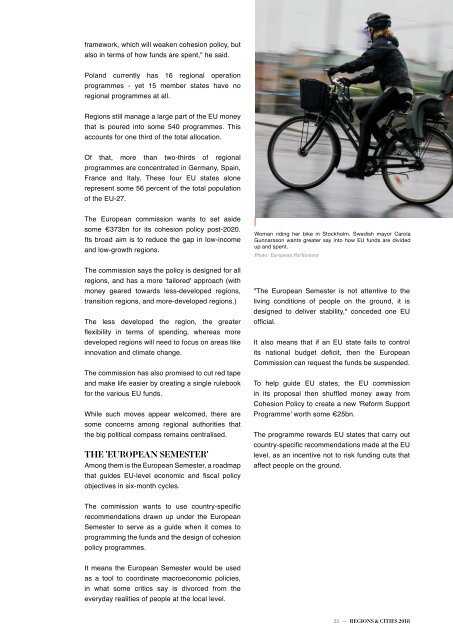Regions & Cities 2018: A deep dive into the EU regional funds
The European Union has allocated around €350bn for the 2014-2020 period to cohesion policy – accounting for a full third of the EU budget. Only the EU's agriculture policy receives more.
The European Union has allocated around €350bn for the 2014-2020 period to cohesion policy – accounting for a full third of the EU budget. Only the EU's agriculture policy receives more.
You also want an ePaper? Increase the reach of your titles
YUMPU automatically turns print PDFs into web optimized ePapers that Google loves.
framework, which will weaken cohesion policy, but<br />
also in terms of how <strong>funds</strong> are spent," he said.<br />
Poland currently has 16 <strong>regional</strong> operation<br />
programmes - yet 15 member states have no<br />
<strong>regional</strong> programmes at all.<br />
<strong>Regions</strong> still manage a large part of <strong>the</strong> <strong>EU</strong> money<br />
that is poured <strong>into</strong> some 540 programmes. This<br />
accounts for one third of <strong>the</strong> total allocation.<br />
Of that, more than two-thirds of <strong>regional</strong><br />
programmes are concentrated in Germany, Spain,<br />
France and Italy. These four <strong>EU</strong> states alone<br />
represent some 56 percent of <strong>the</strong> total population<br />
of <strong>the</strong> <strong>EU</strong>-27.<br />
The European commission wants to set aside<br />
some €373bn for its cohesion policy post-2020.<br />
Its broad aim is to reduce <strong>the</strong> gap in low-income<br />
and low-growth regions.<br />
The commission says <strong>the</strong> policy is designed for all<br />
regions, and has a more 'tailored' approach (with<br />
money geared towards less-developed regions,<br />
transition regions, and more-developed regions.)<br />
The less developed <strong>the</strong> region, <strong>the</strong> greater<br />
flexibility in terms of spending, whereas more<br />
developed regions will need to focus on areas like<br />
innovation and climate change.<br />
The commission has also promised to cut red tape<br />
and make life easier by creating a single rulebook<br />
for <strong>the</strong> various <strong>EU</strong> <strong>funds</strong>.<br />
While such moves appear welcomed, <strong>the</strong>re are<br />
some concerns among <strong>regional</strong> authorities that<br />
<strong>the</strong> big political compass remains centralised.<br />
THE '<strong>EU</strong>ROPEAN SEMESTER'<br />
Among <strong>the</strong>m is <strong>the</strong> European Semester, a roadmap<br />
that guides <strong>EU</strong>-level economic and fiscal policy<br />
objectives in six-month cycles.<br />
Woman riding her bike in Stockholm. Swedish mayor Carola<br />
Gunnarsson wants greater say <strong>into</strong> how <strong>EU</strong> <strong>funds</strong> are divided<br />
up and spent.<br />
Photo: European Parliament<br />
"The European Semester is not attentive to <strong>the</strong><br />
living conditions of people on <strong>the</strong> ground, it is<br />
designed to deliver stability," conceded one <strong>EU</strong><br />
official.<br />
It also means that if an <strong>EU</strong> state fails to control<br />
its national budget deficit, <strong>the</strong>n <strong>the</strong> European<br />
Commission can request <strong>the</strong> <strong>funds</strong> be suspended.<br />
To help guide <strong>EU</strong> states, <strong>the</strong> <strong>EU</strong> commission<br />
in its proposal <strong>the</strong>n shuffled money away from<br />
Cohesion Policy to create a new 'Reform Support<br />
Programme' worth some €25bn.<br />
The programme rewards <strong>EU</strong> states that carry out<br />
country-specific recommendations made at <strong>the</strong> <strong>EU</strong><br />
level, as an incentive not to risk funding cuts that<br />
affect people on <strong>the</strong> ground.<br />
The commission wants to use country-specific<br />
recommendations drawn up under <strong>the</strong> European<br />
Semester to serve as a guide when it comes to<br />
programming <strong>the</strong> <strong>funds</strong> and <strong>the</strong> design of cohesion<br />
policy programmes.<br />
It means <strong>the</strong> European Semester would be used<br />
as a tool to coordinate macroeconomic policies,<br />
in what some critics say is divorced from <strong>the</strong><br />
everyday realities of people at <strong>the</strong> local level.<br />
23 — REGIONS & CITIES <strong>2018</strong>

















